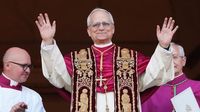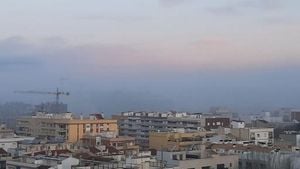In a historic moment for the Catholic Church, Robert Francis Prevost, a 69-year-old Archbishop from Chicago, has been elected as Pope Leo XIV, the 267th Pontiff. This marks a significant milestone as Prevost becomes the first U.S. American to lead the 1.4 billion members of the global church. His election is seen as a compromise and a signal of unity within the church, reflecting a blend of American roots, Latin American influence, and extensive Roman leadership experience.
Born in Chicago in 1955 to parents of French, Spanish, and Italian descent, Prevost initially studied mathematics before joining the Augustinian Order in 1977. He was ordained as a priest in Rome in 1982 and later earned a doctorate in canon law. From the mid-1980s, Prevost served as a missionary in Peru, where he founded parishes, directed a seminary, and played a significant role in training bishops. His leadership capabilities were recognized in 2015 when Pope Francis appointed him as Bishop of Chiclayo, a diocese in northern Peru, where he advocated for stability during political crises.
In 2023, Prevost was appointed as the head of the Vatican's Dicastery for Bishops, effectively the church's personnel office, and received the cardinal's hat. Despite his prominent role, he has remained low-key, avoiding the media spotlight. According to La Repubblica, he is regarded as pragmatic and moderate, embodying continuity in the spirit of Pope Francis.
Prevost's election comes at a time when the Catholic Church faces numerous challenges, including a decline in membership in the West, where approximately 25 percent of the U.S. population identified as Catholic in 2024, according to Vatican statistics. In contrast, the church is experiencing dynamic growth in Africa and Asia. Prevost's extensive experience in Latin America, where Catholicism is deeply embedded in the social and cultural fabric, positions him uniquely to lead the church through its current trials.
As the new Pope, Prevost is expected to uphold Pope Francis's legacy of listening and fostering dialogue while advocating for reform without alienating traditionalists. He has repeatedly emphasized the need for the church to be more transparent and inclusive, particularly regarding the role of laypeople. However, he has also expressed resistance to certain reforms, such as the ordination of women, warning against a "clericalization of women" at the World Synod in 2023, asserting that women already play vital roles within the church.
Prevost's inauguration is set for May 18, 2025, at St. Peter's Square, where he will receive the papal insignia, including the woolen pallium and the fisherman's ring. This ceremony is expected to draw numerous heads of state and hundreds of thousands of pilgrims and tourists from around the world. In the lead-up to his official start, Prevost will hold his first public midday prayer on May 11, followed by a press meeting on May 12 and a gathering with ambassadors accredited to the Holy See on May 16.
In his first Mass on May 9, 2025, before the cardinals, Prevost showcased his humor and warmth, blessing attendees and speaking in English to emphasize the church's universal mission. He lamented the loss of faith, addressing the crisis of the family and other societal wounds in his inaugural sermon. His message resonated with many, including Freiburg Archbishop Stephan Burger, who expressed relief over the swift election of a new Pope amid the turmoil following Pope Francis's passing.
Reactions to Prevost's election have been mixed, reflecting the diverse expectations of the Catholic community. While some see him as a bridge-builder capable of fostering dialogue within the church and society, others express concern over his past handling of abuse cases during his tenure in Chicago and as Bishop of Chiclayo. Prevost has denied these allegations, and the diocese has rejected the claims.
Prevost's international background is noteworthy; he has spent half his life outside the United States, with 24 years in Peru. His experiences in various cultural contexts, combined with his roles as a missionary and church leader, have equipped him to navigate the complexities of the modern Catholic Church. He is the first Pope to hold a Vatican passport, symbolizing his unique position within the church hierarchy.
As Pope Leo XIV, Prevost inherits the legacy of his namesake, Leo XIII, who was the first Pope to address social justice issues in his encyclical, "Rerum Novarum." This connection hints at Prevost's commitment to addressing social inequalities and advocating for the marginalized, a theme that resonates strongly in today's world.
In the wake of his election, various leaders and organizations have voiced their hopes for Prevost's papacy. Baden-Württemberg's Minister-President Winfried Kretschmann emphasized the need for a church that boldly addresses contemporary challenges and champions necessary reforms. Similarly, Catholic women from the Diocese of Rottenburg-Stuttgart have called for equal rights for women in the church, urging the new Pope to take decisive steps toward gender equality.
Prevost's leadership will be closely watched, particularly as he navigates the delicate balance between tradition and reform. With a global church facing myriad issues, including the ongoing crisis of faith, social justice, and the role of women, the new Pope's approach will be pivotal in shaping the future of Catholicism.
As the world awaits the official inauguration of Pope Leo XIV, one thing is clear: his journey from Chicago to the Vatican is a testament to the evolving nature of the Catholic Church, and his leadership may well define a new chapter in its history.





